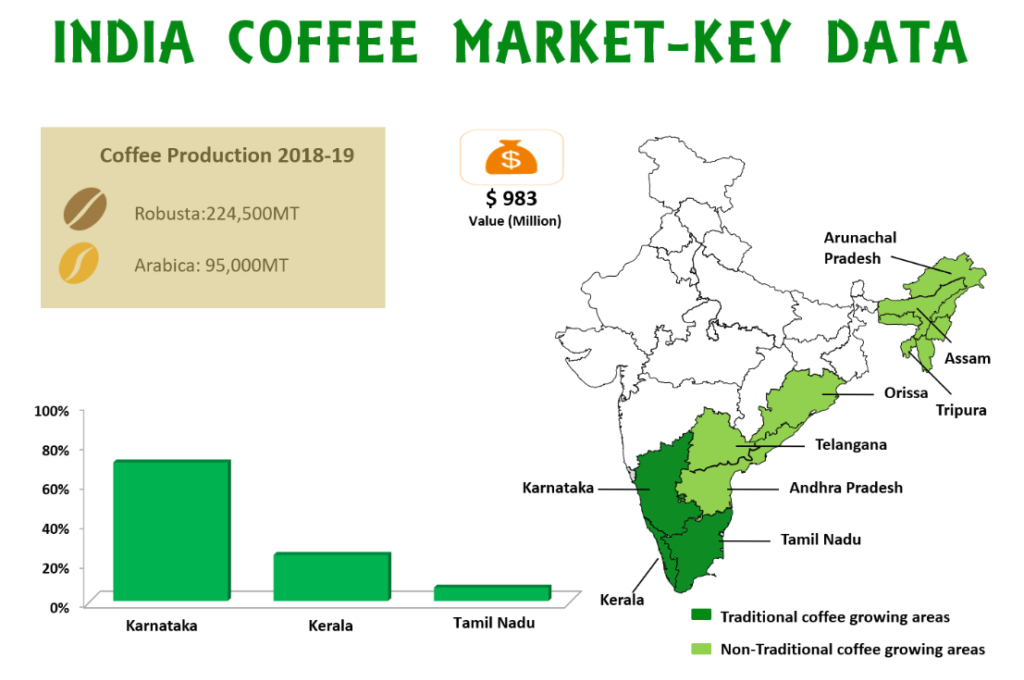Indian Economy
Drop in Coffee Output
- 25 Nov 2021
- 5 min read
Why in News
As per data provided by the planters’ community, India’s arabica coffee production will drop by 30% and robusta by 20% this harvest season ending January.
Key Points
- Current Challenges:
- Excessive Rainfall:
- Coffee production will drop due to excessive rainfall, plant damage, bean splitting and berry dropping.
- Coffee-growing regions in India are witnessing extended rains brought about by the depression and low pressure areas in the Bay.
- Harvesting of arabicas, which is currently going on, is challenging during rains for the drying and spreading of the bean in the yards.
- Coffee production will drop due to excessive rainfall, plant damage, bean splitting and berry dropping.
- Cost of Coffee Production:
- The increasing production costs, including fertilizers and labour costs, are expected to reduce growers’ current gains from increased prices and slow down investment in production.
- Excessive Rainfall:
- Coffee:
- History:
- Coffee was introduced to India during the late seventeenth century.
- The story goes that an Indian pilgrim to Mecca smuggled seven beans back to India from Yemen in 1670 (it was illegal to take coffee seeds out of Arabia at the time) and planted them in the Chandragiri hills of Karnataka.
- The Dutch (who occupied much of India throughout the 17th century) helped spread the cultivation of coffee across the country, but it was with the arrival of the British Raj in the mid-nineteenth century that commercial coffee farming fully flourished.
- About:
- Coffee in India is grown under a canopy of thick natural shade in ecologically sensitive regions of the Western and Eastern Ghats.
- This is one of the 25 biodiversity hotspots of the world.
- Coffee is predominantly an export oriented commodity and 65% to 70% of coffee produced in the country is exported while the rest is consumed within the country.
- Coffee contributes significantly to sustain the unique bio- diversity of the region and is also responsible for the socio-economic development in the remote, hilly areas.
- Coffee in India is grown under a canopy of thick natural shade in ecologically sensitive regions of the Western and Eastern Ghats.
- Climatic Conditions Required:
- Coffee plants require a hot and humid climate with temperatures ranging between 15°C and 28 °C and rainfall from 150 to 250 cm.
- Frost, snowfall, high temperature above 30°C and strong sun shine is not good for coffee crops and is generally grown under shady trees.
- Dry weather is necessary at the time of ripening of the berries.
- Stagnant water is harmful and the crop is grown on hill slopes at elevations from 600 to 1,600 metres above sea level.
- Well drained, loams containing a good deal of humus and minerals like iron and calcium are ideal for coffee cultivation.
- Soil Types for Coffee Production:
- Coffee can be grown on lots of soils but the ideal types are fertile volcanic red earth or deep sandy loam.
- For coffee trees to grow it is important that the soil is well draining which makes heavy clay or heavy sandy soils inadequate.
- Major Areas:
- In India, coffee is traditionally grown in the Western Ghats spread over Karnataka, Kerala and Tamil Nadu.
- Karnataka is the largest producer accounting for about 70% of the total coffee production.
- Coffee cultivation is also expanding rapidly in the nontraditional areas of Andhra Pradesh and Odisha as well as in the North East states.

- In India, coffee is traditionally grown in the Western Ghats spread over Karnataka, Kerala and Tamil Nadu.
- Main Varieties: Arabica and Robusta are grown in India.
- Arabica is mild coffee, but the beans being more aromatic, it has higher market value compared to Robusta beans. On the other hand Robusta has more strength and is, therefore, used in making various blends.
- Arabica is grown in higher altitudes than Robusta.
- Arabica requires more care & nurture and is more suitable for large holdings whereas Robusta is suitable irrespective of size of the farm.
- Arabica is susceptible to pests & diseases such as White Stem Borer, leaf rust etc., and requires more shade than Robusta.
- The harvest of Arabica takes place between November to January, while for Robusta it is December to February.
- Arabica is mild coffee, but the beans being more aromatic, it has higher market value compared to Robusta beans. On the other hand Robusta has more strength and is, therefore, used in making various blends.
- History:






